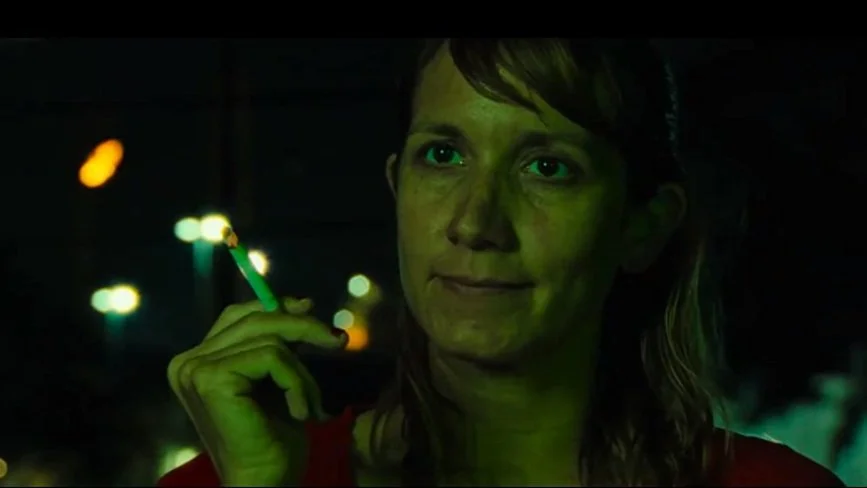Red Rocket (dir. Sean Baker, 2022)- Review
People have long defined themselves by what they do and where they come from. Surnames which survive to the present day- Bakers, Carpenters, Smiths and the like- denote not only an ancestor’s craft, but their recognition, and purpose, in society. And so we come to ‘Mikey Sabre’: a middle-aged porn star who washes up in his Texas City hometown in 2016, triggering a riotous, nauseating plunge into the states of nature and narcissism.
Director Sean Baker’s premise offers a clever perspective on the inadmissible crisis of American identity: its newfound impotence. The barrage of ‘shocking’ or provocative plot elements- porn, drugs, grooming, Trump- clash with a sly, building detachment in the viewer, as Baker establishes industrial Texas as a primal, bizarre land before time. Shots recall the Wild West or post-apocalyptic disaster zones- at least until an obese woman rolls past on a mobility scooter. The intense, disorienting visual contrasts frame Red Rocket in uncomfortable yet indisputable physical realities, where ‘polite society’ and its norms simply do not exist.
Baker presents a similar duality between Hollywood and the porn industry: the public and private faces of America’s Shangri-La, Los Angeles, churning out yin-yang images of ‘manhood’ distinguished only by their status in society. By centring a “white trash” porn star as a peak form of simultaneous privilege and stigma, Red Rocket illuminates the wider phenomenon of the ‘left behind’ with a wry yet unsentimental tone- mobilising the mixed fascination and disgust, and the suspension of regular morals, associated with the sex industry and public perceptions of it. In the film, as in real life, the porn star acts as both idol and scapegoat for unspeakable, base human traits; in this case, though, the awful, secret discovery is not sexual desire but emasculation.
Porn is one of few contexts to acknowledge the uneasy tension between performance and authenticity in everyday interaction; Red Rocket develops this conceit into a funhouse mirror labyrinth of ‘image’ and ‘reality’. Simon Rex, who plays Mikey, has worked as a VJ, model, and one-time gay porn actor. The crew shot on location in Texas City, with locals plucked up to join the cast (including breakout favourite, the late Brenda Deiss, playing Mikey’s mother in law). The unmistakeable, unsentimental authenticity of their world seeps into every twist of the plot, steering the film away from sensationalism into grim resignation. This desensitisation develops to delusion in Mikey, an extreme illustration of recognisable instincts- the forces which lie beneath the constraints of mainstream morality- from which the audience is cushioned by his degraded status as a sex worker.
What a piece of work is a man- or in this case, a man-child. Mikey rocks up at the home of estranged wife Lexi (Bree Elwood) and her mother Lil (Brenda Deiss), back in his hometown with no money, no belongings, and no explanation as to why he’s suddenly departed from his glittering career as a porn star. Handsome, muscular, well-endowed, Mikey tries to parlay his small-town celebrity status into a triumphant return, regaling high-school hangers on with Pornhub view counts and his triumphs at the AVN’s (“dude, they’re like the Oscars of porn”). It becomes all too clear, though, that his identity as a model of manliness- which runs so deep as to obscure even his real name- has no grounding in fact. He can’t get a job; he relies on the charity of his ex and her mother; he can’t even drive, and pedals over town on a comically tiny bike.
The film unblinkingly, inexorably reveals Mikey- the charismatic, flashy icon of virility and agency- as an impotent object. Simultaneously, it demonstrates that he will never be able to reconcile his humiliating physical state with his previous identity. The details of Mikey’s descent into deluded, self-aggrandising fantasy are specific to his line of work; the emotional logic of the ‘left behind’ is not.
‘Blue collar’ American manhood usually invokes two key traits: the ability to work and to provide for a family. Mikey’s previous identity, a distorted performance and commercialisation of those aspects, has destroyed his ability to connect or function in ‘civilised’ society'; unmoored from either its support systems or its taboos, he retreats into the comfort of fantasy, finding his ‘happily ever after’ in a 17 year old cashier at a donut shop.
Mikey’s obsession with Strawberry (Suzanna Son) offers the clearest example of Red Rocket’s methodical, blunt study in the logic of desperation, and the unspeakable intersections of fantasy and fact in everyday life. Mikey sees in Strawberry a fantasy panacea to his unbearable, unthinkable impotence: he can make himself a man again, first by having sex with her, and then by using her to relaunch his porn career, just as he did with Lexi. The audience can understand this; Lexi can understand this; but no one can change it.
The theme of self-recognition runs deep in Red Rocket. Having acted as an image of manliness for his entire life, Mikey can’t face seeing himself, and his future, in the dead-end domesticity of his wife and mother-in-law. Bouncing around the mall, cycling around town on his tiny bike, and having sex with a teenager, he reinvents a version of himself, where past glory can only lead to future greatness.











